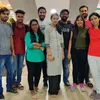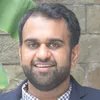How this diagnostics startup wants to make workplaces safe amid coronavirus
Hyderabad-based diagnostics startup DoctorC launches Safe Workplace of the Future, an initiative that aims to make getting back to work efficient and scalable, while ensuring compliance and safety.
The late Dr C Dayakar Reddy, the Founder of Hyderabad-based CDR chain of hospitals, was associated with healthcare services for over 30 years. He realised that practices in the healthcare industry were increasingly provider-centric and anti-consumer.
Keen to make a change, he started Hyderabad-based diagnostic startup in 2012 to provide medical tests and scans at cheaper rates.
After his demise in 2014, the startup has been run by his son, Neehar Reddy Cherabuddhi, and Mansi Gandhi and Karan Kurani. Working on the diagnostics startup since the beginning, they have seen the company evolve and grow.

The DoctorC team
“We build our own software and have our own medical teams. We also have a strong referral network of diagnostic labs and hospitals to extend our range of services,” Neehar says.
Now, as the world tries to cope with the new normal amid the coronavirus pandemic, the startup has launched a new initiative - Safe Workplace of the Future – to facilitate the creation of a safe and compliant workplace.
In the beginning
When Mansi, Karan, and Neehar moved back to India from Silicon Valley, they saw first-hand how unfriendly the healthcare industry was to the average consumer. Neehar and Mansi met at Oracle, in the Bay Area, where they started their careers after graduating in computer science from Brown University and Cornell University respectively.
Karan was also working in the Bay Area at the time. He was one of the early employees at Funzio, a gaming company, which he joined after completing his master’s course from Cornell U. He exited the company after it was acquired by GREE for $210 million.
The three decided to return to India to solve problems that people at home were facing. They decided to use Dr Reddy’s domain expertise and their technology prowess to change the healthcare system and ensure great customer experiences.
The trio faced several challenges: from convincing labs to partner with the team to convincing customers and recruiting the right people. “Over the last six years, we have overcome these challenges and currently have operations in 13 cities in India,” Neehar says.
Work during COVID-19
Today, the team is facing a different set of challenges. As a diagnostic care provider, one of the biggest challenges is the changing testing guidelines for COVID-19 testing.
DoctorC offers end-to-end diagnostics through its app, website, and call centre. Customers can choose to get a test at home or visit partner labs.
“As we wait for regulations to standardise, we are expanding our offerings for a post-COVID era. One of the major challenges we see for commercial establishments is providing employees with a safe and secure environment. To enable this, we are launching Safe Workplace of the Future, which will facilitate the creation of a safe and compliant workplace amid COVID-19,” Neehar says.
What is Safe Workplace of the Future?
Safe Workplace of the Future has been developed to make getting back to work efficient and scalable, while ensuring compliance and safety for all. It includes a combination of software and automated monitoring using devices such as:
Safety dashboard: To monitor employee health and safety, identify who is unsafe, provide on-call doctor consultations via the DoctorC network of doctors
Mobile app for employees: For daily self-reporting by employees.
Automated thermal cameras: To enable temperature monitoring at entry points
Respiratory monitoring: For automated monitoring of isolation spaces
Facial recognition: To identify those not wearing masks in the premises.
Apart from this, the healthcare startup also provides COVID-19 tests in partnership with authorised labs for those suspected to be positive; sets up social distancing markings, decontamination areas and isolation zones; and provides equipment like masks, sanitisers, PPEs, etc.
DoctorC is currently present in 13 cities, has over 1.2 million registered users, and has an NPS of 70+ across tens of thousands of reviews for their home service. Its partner labs include some of the largest diagnostic chains in the country.
“We continue to grow rapidly and are profitable and cash-flow positive,” Neehar says.
Customers pay per transaction, and Doctor C has two primary revenue streams. Under the home Service, customers opt for a healthcare service done at home by DoctorC medical personnel. Customer walk-ins at providers in the startup’s referral network are the other source of revenue.
Funding and the sector
DoctorC is funded by DA Prasanna, who founded General Electric Medical Systems in India, and has founded, scaled, and exited multiple businesses. It is also funded by Anthill Ventures, Anil Dharni, Founder at Funzio, Periot Jain, The Manipal Group, BITS Spark. Some of the other investors include Aluri Road, former MD of Morgan Stanley PE, Chaitanya Deshpande, Head of investments for Marico and Advisor to Mariwala Family Office, and Gautam Pai.
Several startups are operating in the healthcare and diagnostic space, including Practo, Mfine, Healthians, Portea, among others. Healthcare collaborative Project StepOne is also providing a helping hand amid the coronavirus crisis.
With regard to COVID-19, the team has two specific goals - start COVID-19 test sales across the country and enable organisations to get back to work safely with the Safe Workplace Initiative.
“We have successfully piloted Safe Workplace of the Future and plan to launch the product over the coming weeks. For our core business of diagnostics continue growing in our existing cities and continue to add new cities regularly. We also plan to add complementary verticals and improve our product offering,” says Neehar.
Edited by Teja Lele










